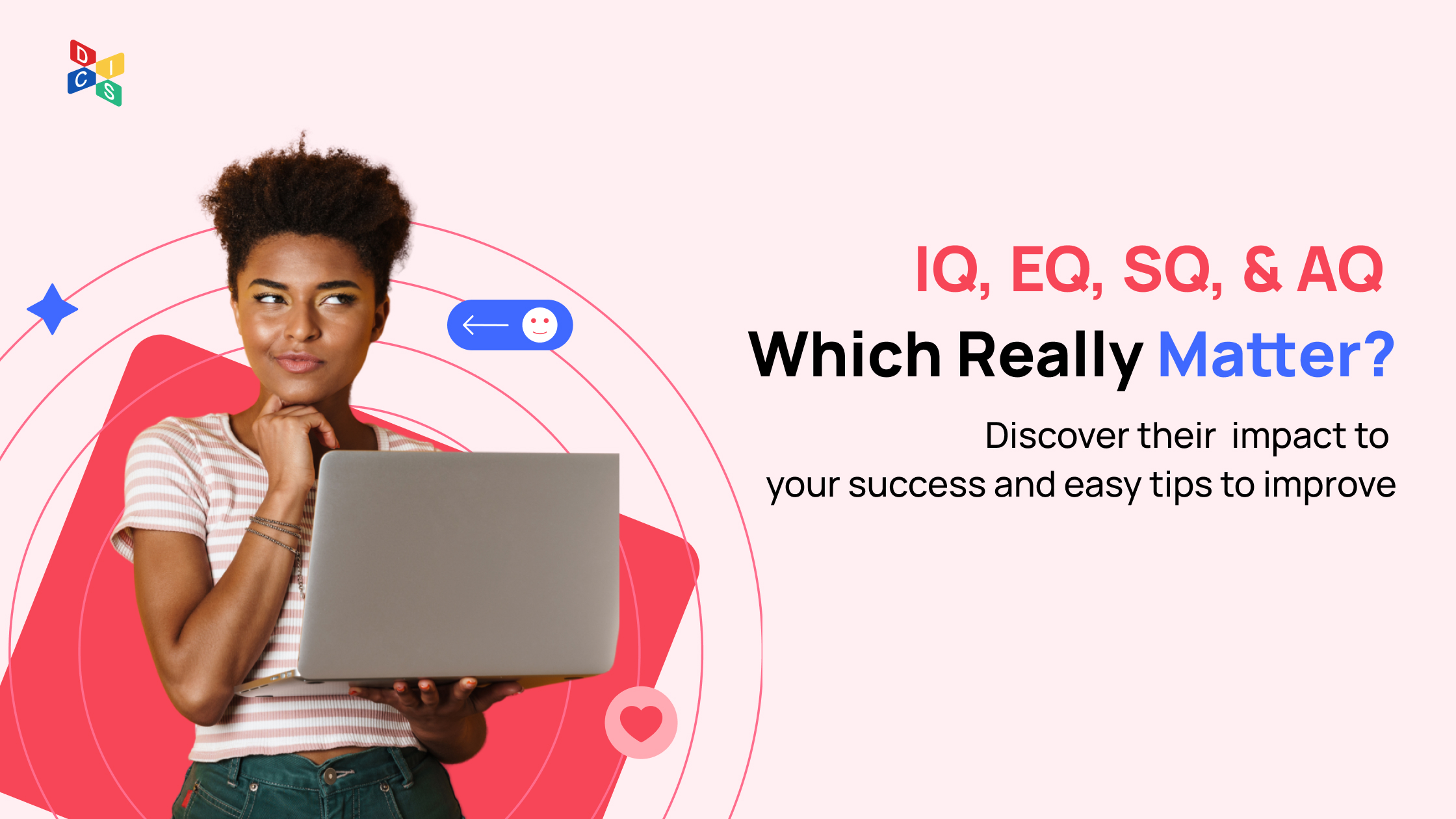Table of content
What Is High EQ? Top 9 Signs Of High EQ People
Learn about high EQ: 9 typical traits, how to improve your emotional intelligence, and dealing with challenges of high EQ characteristics.
Emotional quotient (EQ) is the ability to know, understand, and manage your own emotions. It also means understanding the emotions of others. Today, EQ is very important in both personal life and work. So, what is the meaning of high emotional intelligence? Let's learn about the signs of emotionally intelligent people and how to improve this skill in the article.
What Is A High EQ Score?
EQ is often measured by tests like MSCEIT, EQ-i, and TEIQue. Studies show that a score from 116 to 130 is seen as high EQ. A score of 130 or more is an excellent EQ.
Those with excellent EQ demonstrate exceptional communication skills, connecting with others effortlessly. Besides, they navigate complex social situations with grace so that everyone can feel heard or understood and avoid unnecessary conflicts. Problem solving is another noticeable trait of emotional intelligence since these people know the underlying feelings and act accordingly to solve problems.
Test yourself: How high is your EQ?
Top 9 High EQ Signs You Might Not Know
People who are emotionally intelligent often show these characteristics:
1. They show high empathy
Emotionally aware people usually demonstrate high empathy. They do not judge others' actions and feelings. Instead, people with high empathy try to understand why others feel and act the way they do. High EQ people put themselves in the other person's shoes. This helps them support others in finding the best solutions and indicates high EQ signs.
2. They give helpful feedback
High EQ test takers usually give supportive and helpful feedback instead of criticism. This makes it easier for others to accept what they say. For example, they might say "you could try" or "consider this" instead of telling someone what to do.
3. They love to help others
Helping others is what high EQ people love to do. When someone is sad or having trouble, people with emotional intelligence know how to comfort them sincerely. They don't say empty phrases like "Everything will be okay." Instead, they acknowledge the other person's pain and offer support. When they praise, they are specific and honest. Instead of saying "You did a good job," they might say, "I was really impressed with how you handled that difficult situation in the meeting today, especially how you listened and found a solution that worked for everyone."
4. They have distinct social skills
High EQ people show great social skills. They use good body language and show real interest in the conversation. They also understand non-verbal cues and can read between the lines to understand the deeper meaning of what others say.
5. They are skilled at emotional regulation
When faced with stress or anger, these people can pause to regulate their feelings. They take a deep breath and respond thoughtfully instead of just reacting. This doesn't mean they never get angry. It means they know how to show their unhappiness in a reasonable and respectful way.
Explore More: IQ or EQ: What is the difference and which one really matter?
6. They stay positive
People with high EQ tend to look for the good in every situation. They learn from failures instead of dwelling on the negative. However, this doesn't mean they are always fake happy. They allow themselves to feel all emotions but don't let negative feelings last too long. Emotionally intelligent people can usually keep a positive attitude and let go of grudges.
7. They are able to judge character
Emotionally intelligent people are often good at judging and being in tune with people’s emotions. They pay attention to details in how others talk, their facial expressions, and body language. This helps them understand others' feelings and judge intentions better. When listening, they focus fully on the speaker. They don't interrupt or rush to give solutions. They also often ask open-ended questions to encourage others to share more.
8. They are responsible and independent
Emotionally aware individuals are usually independent and willing to take responsibility. When they face problems, they often try to figure things out themselves before asking for help. If they make a mistake, they admit it, try to fix it, and show they are in control and responsible in all situations.
9. They keep their promises
Emotionally aware individuals only make promises they can keep. They always try to follow through. If they can't keep a promise due to something they can't control, they let others know early, apologize, and try to make things right.
Test yourself: How high is your EQ score
The Downsides Of High EQ
While emotional intelligence has many benefits, it can also have some challenges and downsides.
Risk of manipulation
Because they can easily understand others' emotions, this can be used to manipulate them if they are not careful. Also, they might be targets for those who want to take advantage of their empathy.
Emotional labor
Because they are very empathetic, people who score high in EQ tests are often the ones others go to for emotional support. This can lead to "emotional labor," a state of tiredness from constantly supporting and caring for others' feelings.
Fear of failure
Emotionally intelligent people are often very sensitive to feedback and can develop a strong fear of failure. They might worry too much about not meeting others' expectations or disappointing someone.
Mental pressure
Due to high expectations from themselves and others, people with emotional intelligence can face a lot of mental stress. They might feel they always need to be the problem solver or the peacemaker in every situation.
Have a fun: Discover the DISC personality traits of the Symbiote family
How To Improve Your EQ?
Emotional intelligence is not fixed. You can develop and improve it over time. Here are some ways to boost your EQ:
Understand and manage your own emotions
The first step to improving EQ is knowing and understanding your own feelings. This includes naming your emotions, understanding why you feel them, and seeing how they affect your behavior. Methods like journaling, meditation, and mindfulness can help you become more aware of your emotions.
Improve communication skills
Good communication is a key part of emotional intelligence. Learning to express your feelings and needs clearly, as well as improving your active listening skills, can greatly improve your EQ.
You May Interest: 17 Effective ways to increase your IQ
Step out of your comfort zone
Developing an emotional awareness requires you to step out of your comfort zone. You need to face situations that might be emotionally uncomfortable. This could mean having difficult conversations, facing fears, or challenging yourself in new social situations.
Practice empathy for others
Empathy is a skill you can develop by practicing. Try to understand others' viewpoints by asking questions, listening without judgment, and imagining yourself in their situation.
Focus on problem solving
People who are emotionally aware focus on finding solutions instead of blaming or complaining. They approach conflicts and challenges with a problem-solving mindset. What’s more, they look for ways to fix things instead of just reacting to negative emotions.
Take emotional intelligence training
Many courses, workshops, and books are available to help you develop emotional intelligence. These resources can provide knowledge, tSools, and specific strategies to increase your EQ.
Boost Your Success With The Help Of DISC EQ Test
You can always improve your EQ with the suggested tips. What’s more, you can track your EQ score to know if you have improved your EQ based on our tips or not. By taking our EQ test, you not only unlock your potential but also know your behaviors with your EQ scores.
Conclusion
High EQ is not something you are born with. It is a skill that can be developed and improved. By understanding the signs of people with high emotional intelligence and using strategies to develop your emotional intelligence, you can get better at understanding and managing your emotions. You can also build stronger, healthier relationships and achieve success thanks to your increased EQ.
Want to know your EQ level? Take our EQ test at discpersonalities.com to find out now!
Frequently Asked Questions (FAQs)
1. What kind of person has high EQ?
People with high EQ signs tend to be aware of the emotions of other people. They also have excellent conversational skills that enable them to make meaningful connections and build lasting relationships. Plus, when they are under pressure, they are able to manage their own emotions in order not to make a scene or say impulsive things.
2. Are people with high EQ smart?
Not necessarily. Emotional intelligence does not equate to cognitive intelligence. You might have characteristics of emotional competence but that does not mean you can think in an abstract way and vice versa.
However, success is not just defined by only IQ or EQ. Balancing both can prepare you for future achievements.
3. Is high EQ rare?
High EQ is actually not rare as many people might think. Because EQ is not permanent, you can always improve this intelligence type. Thus, while not everyone possesses exceptionally high emotional intelligence, it's also not considered extremely rare, especially among successful individuals.


Don't Let Your Potential Stay Hidden!
Take the DISC test today and discover your unique 'YOU', with deep insights into your true personality and potential.

Represents your instinctive behaviors and desires.
Shows the behavioral tendencies you think you should exhibit in specific situations.
Related articles
You may also be interested in
 IQ, EQJul 17, 2025
IQ, EQJul 17, 2025IQ, EQ, SQ, & AQ: Which One Really Matter To Your Success?
Success is almost impossible without these 4 quotients: IQ, EQ, SQ, AQ. Read this article to see why all 4 matter and how they can impact your career ladder.
 IQ, EQJun 19, 2025
IQ, EQJun 19, 20257 Facts About IQ You May Not Know
Think you know IQ? Discover 7 lesser-known facts about IQ that may blow your mind. Let’s get ready to be amazed!
 IQ, EQMay 29, 2025
IQ, EQMay 29, 2025What Is A High IQ? Definition, Classifications & Key Insights
Wondering what is considered a high IQ? Explore IQ classifications, what a high IQ score means, and how it impacts success in our detailed guide.
